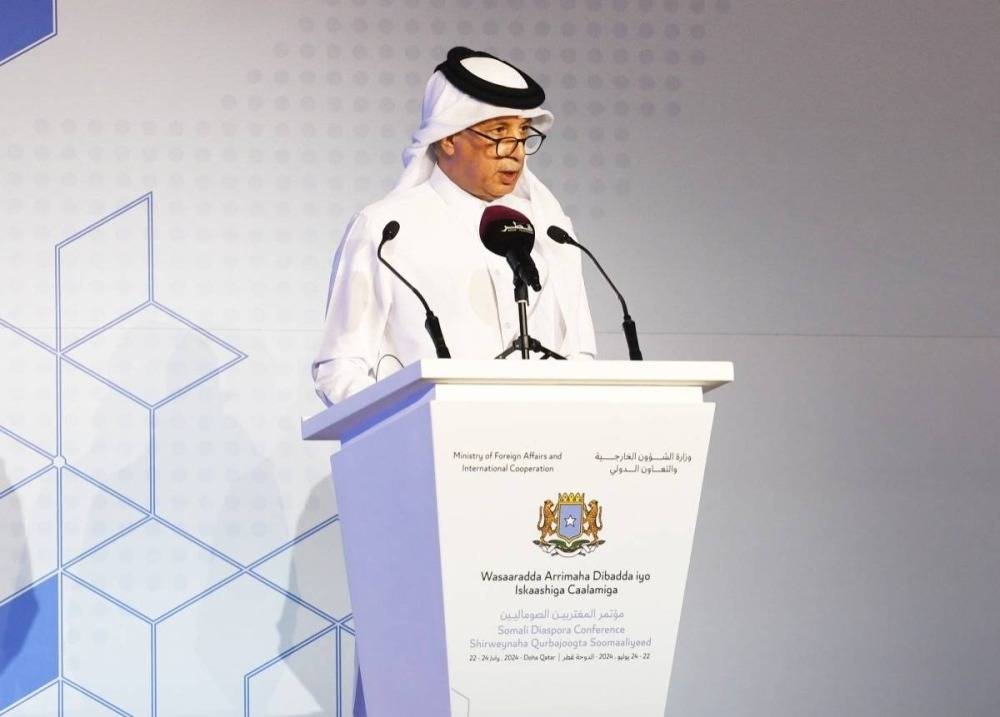HE the Minister of State for Foreign Affairs Sultan bin Saad al-Muraikhi has underlined that the Somali Diaspora Conference, currently in session in Doha, constitutes an important opportunity to discuss how to employ the expertise and capabilities of Somali communities abroad in building and developing Somalia and strengthening the economy through investors and entrepreneurs and capacity building through training and development programmes.
In addition it will help review potential challenges and opportunities for Somali expatriates to participate in the development of their country, and highlighting their success stories in this context.
In his speech during the opening of the three-day conference, HE al-Muraikhi said that the conference, which is being held for the first time in an Arab country, is a forum that includes members of Somali communities abroad, who have faced many challenges in the diaspora countries, such as the difficulty of integrating into new societies, adapting to the different cultures of diaspora countries, the difficulty of maintaining cultural identity, unemployment and difficult economic conditions.
He added that despite these challenges, the members of the Somali community in the diaspora have been able to overcome these obstacles, which reflects the great ability of the Somali community to adapt and integrate with local communities, while preserving its cultural identity, in addition to overcoming difficult economic circumstances.
He stressed the importance of concerted international efforts and the contribution of Somali expatriates in building their country, noting that Qatar will remain supportive of Somalia. HE al-Muraikhi pointed to the important role played by Qatar in implementing many vital development, reconstruction, and rehabilitation projects in Somalia, including; building roads such as the Mogadishu-Afgooye Road Project, and the Mogadishu-Johar Project, in addition to Qatar’s contribution to the rehabilitation and construction of the headquarters of the Ministry of Planning and Investment, and the construction and rehabilitation of the Mogadishu Municipality Building, besides its support for security capabilities, economic empowerment programmes, and creating jobs for youth in Somalia.
He added that Qatar is also implementing many development and sustainable projects in Somalia to enhance stability, security and peace, emphasising that Qatar will spare no effort in supporting Somalia to achieve prosperity and stability.
For his part, Somali Prime Minister Hamza Abdi Barre expressed his deep thanks and appreciation to Qatar for hosting this important conference, noting that this hosting reflects the strong fraternal relations between the two countries.
In his speech during the opening of the conference, the Somali prime minister appreciated Qatar’s continuous and generous support for the Somali people in various fields, praising its giving during the ordeal of the conflict in Somalia, and its great efforts through which it sought to bridge the rift and bring the views of the Somali parties closer together.
He said that this conference reflects the aspirations and goals of the Somali people to achieve development and prosperity, through discussing ways of fruitful co-operation between Somalis abroad and their country of origin, in a way that contributes to achieving the comprehensive renaissance of their country.
He pointed to the prominent role played by the Somali community in the diaspora in various fields.
The Somali prime minister said that economic partnerships are one of the most important means of achieving sustainable growth, calling in this regard for the establishment of strategic partnerships that contribute to the development of various aspects of life, especially in the fields of education, health, insurance, and finance.
He said that enhancing production capabilities and opening new markets for national products are considered vital steps towards achieving economic stability, noting his country’s endeavour to enhance trade exchange with various countries of the world to improve the national economy.
He said that utilising Somali natural resources sustainably is essential for achieving sustainable development, expressing his hope that Somali expatriates would contribute to establishing companies in the field of renewable energy.
He also highlighted the need for their role in managing national resources, including fisheries, livestock, and agriculture, and in implementing best practices in these areas.
He highlighted the most prominent challenges facing his country, such as; environmental challenges, poverty, and building productive societies, noting the Somali government’s efforts to improve security and stability in the country, as enhancing security is a basis for creating an attractive environment for investments, which contributes to achieving sustainable economic development. (QNA)
Qatar
Conference ‘offers opportunity to discuss ways to build Somalia, strengthen economy’
Minister of State for Foreign Affairs: Somali Diaspora

